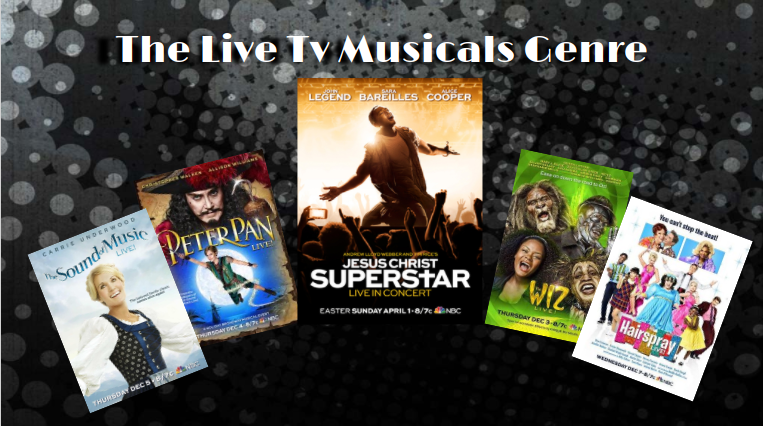The rise of “live” televised musicals and how it affects the art of theatre
“Jesus Christ Superstar,” one of the most influential rock-based musicals of the past century, was recently turned into a live televised concert on NBC this past Sunday. The production featured a significant amount of star power, with John Legend portraying the titular character, along with Sara Bareilles and Alice Cooper in supporting roles. Not only is this live show reviving an important piece of musical history, but it’s also one of many “live” televised musicals that have hit the airwaves in the past decade.
This is far from the first time a live musical adaptation has been attempted. In fact, live television musicals have been going on for quite awhile now and are arguably its own genre. The concept of it is to take a usually well known or popular musical and adapt it to fit a televised format. Usually, these shows will feature celebrities in the starring roles and high-tech special effects that couldn’t otherwise be achieved through the typical theatre format.
The first successful use of the live musical format was with NBC’s “The Sound of Music,” starring Carrie Underwood in the starring role in 2013. NBC would soon follow with adaptations of “Peter Pan,” “The Wiz,” and “Hairspray,” the latter featuring the major star power of Ariana Grande and Jennifer Hudson.
However, NBC’s not the only television channel pumping these live shows out. Fox soon presented their own live shows with adaptations of “Grease” and “A Christmas Story: The Musical”. And it doesn’t seem to end their as NBC plans to adapt “Bye Bye Birdie” with Jennifer Lopez in late 2018, while Fox intends on adapting “Rent” in early 2019.
The most important question to ask when analyzing the rise of these televised musical theatre shows is the ultimate purpose of them. Why has there been such a increase in this form of entertainment? And how does it benefit the theatre industry?
Although the quality of said work can often come to question, one of the most commendable things about this artform is how it’s able to showcase musicals to a wider audience in the more accessible format of television. Let’s face it: the general public is unlikely to be into musical theatre and seeing these shows are incredibly difficult. Not only are tickets incredibly pricey, but unless it happens to be in your area or was filmed, there isn’t a lot that provokes people to seek out these shows, especially for repeat viewings.
By using the television format, people are able to see these shows at an easier and cheaper level, especially shows that haven’t had that much popularity. Shows like “Grease” and “The Sound of Music” are classics that a large amount of people would know, but shows like “The Wiz” are likely to be known only by the theatre community, so introducing people to the world of theatre and its many undiscovered gems is a huge plus of the live show format.
It’s obvious that one of the main intentions of these programs is to reach a more mainstream audience and introduce people to theatre. One strategy that has produced mixed results was the casting of celebrities in many of the major roles. Star power is one of the main ways advertisers try to get people glued to their product, and getting these celebrities not only ensures higher ratings. It seems to have paid off as many of these programs average around nine million viewers on average. Some of the casting has produced negative feedback, like the casting of Christopher Walken as Captain Hook in “Peter Pan,” while others have been praised like Vanessa Hudgens as Betty Rizzo in “Grease.”
The addition of star power also leads people in to witness Broadway veterans that they wouldn’t have heard if they hadn’t watched the live show. People tuning in to see “Jesus Christ Superstar” may of came to see John Legend as Jesus or Sara Bareilles as Mary, but will stick with it when introduced to theatre actors like Brandon Victor Dixon as Judas or Norm Lewis as Caiaphas. The combination of mainstream and traditional successfully introduces a millennial crowd to the deeper layers of the theatre business.
The biggest draw of these televised programs are the inclusion of it being “live.” Although many do include prerecorded bits and visuals added later in post, the fact that many of these shows are filmed in one take and in front of a live audience takes the magic of the theatrical experience and shows it through a mainstream lense. Broadway shows are known for people working eight days a week to perform a show straight through nearly to perfection, so letting people see that on a televised format introduces the world to what makes theatre special.
Die hard musical theatre fans may not be impressed with the use of celebrities and sometimes shallow quality of these shows, but the intent that shines through gives these live musical theatre specials a meaningful place on television. Introducing a new world to the magic of theatre and its many classics is a noble effort on tv stations behalf and I hope to see this go even further in the years to come.

Ben Weiss is a senior perspectives editor and writer. It will be his second and last year on The Stampede. Other activities he’s involved in include...



Matthew • Oct 17, 2018 at 9:40 am
I would love to see a Dear Evan Handson or the Adams Family Values on Tv. but alas, that wont happen for a while. might as well watch the bootleg verson of it on youtube. :0
darkstripe • Apr 15, 2018 at 4:15 pm
jesus christ superstar was amazing imo. i personally love that musical and they staged it really well
although i’ll only really get excited if they start broadcasting opera live on television. they do it in movie theaters already but having it on television would be amazing
too bad that’ll never happen lol
Alicia • Apr 12, 2018 at 1:46 pm
I feel like this really gives a reason to watch a musical for those who aren’t interested in theater. They’re doing surprisingly well with the shows. I personally enjoy them.
Jake • Apr 12, 2018 at 9:55 am
I agree
musical lover • Apr 12, 2018 at 9:46 am
now all they need is phantom of the opera live
Reality Doctor • Apr 12, 2018 at 7:24 am
I don’t see the hate coming this time. This is an actually good article because a lot of people including me admire these musicals.
Reality Doctor • Apr 12, 2018 at 7:37 am
By the way. When you write your next article, try not to use a verb in the title.
Wut • Apr 18, 2018 at 10:58 am
What’s wrong with using a verb in the title?
Reality Doctor • Apr 24, 2018 at 11:24 am
It’s just like every other title, but since he’s writing the article, it’s feels threatening.